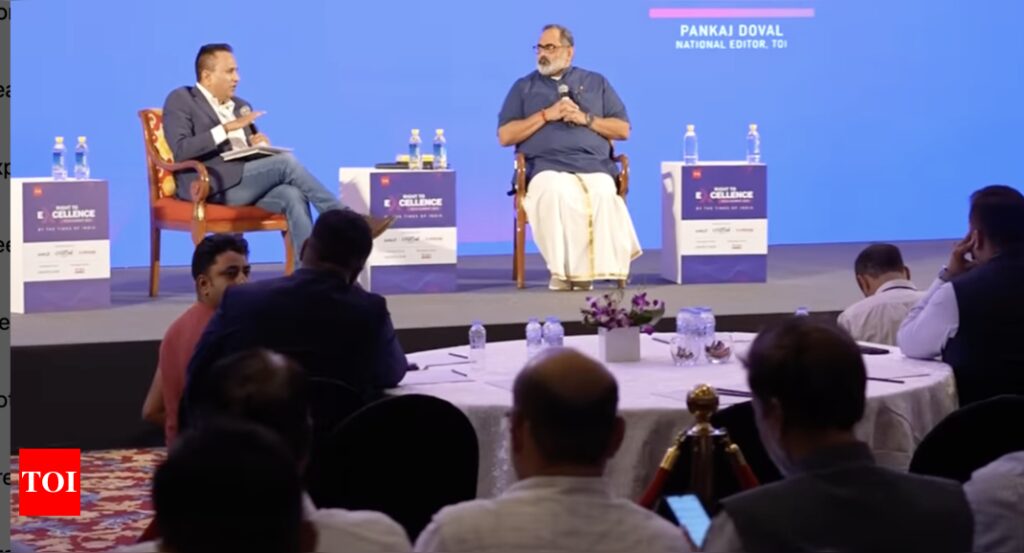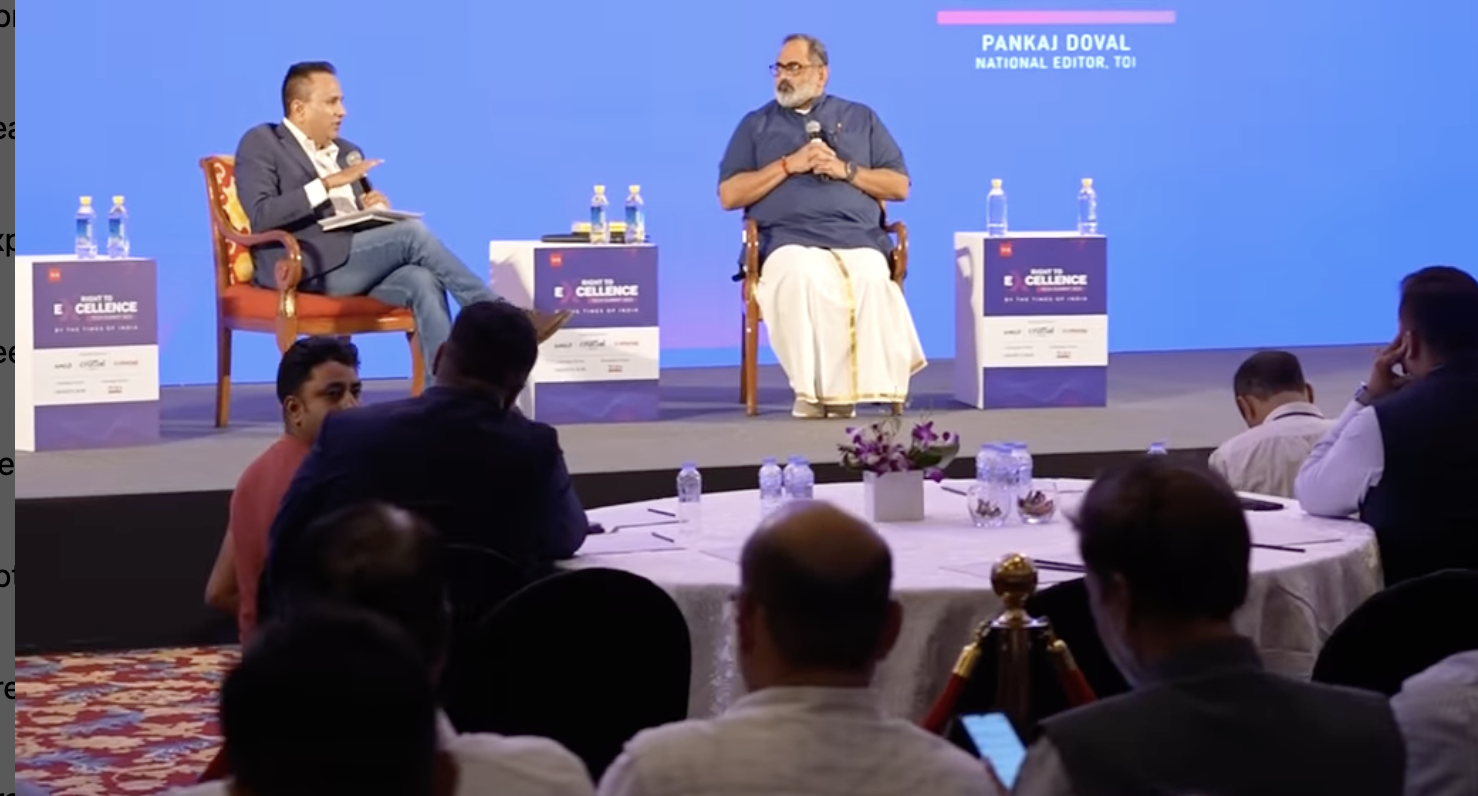[ad_1]
Rajeev Chandrasekhar, minister of state for electronics and information technology, said that in the next three years, India’s impetus in tech sector manufacturing will lead to close to 50 lakh jobs. At The Times of India Right To Excellence Tech Summit 2023, Chandrasekhar said that companies like Apple, Micron and others are looking for trustworthy partners and economies. “We are the fastest growing digital economies, except for China and South Korea and are encouraging companies to move supply chain to India,” said Chandrasekhar. India is looking at a target of becoming a $300 billion electronics industry, he said. Rajeev Chandrasekhar, Minister of State for Electronics and Information Technology, said that India’s push for tech sector manufacturing will create nearly 5 million jobs in the next three years. At The Times of India Right To Excellence Tech Summit 2023, Chandrasekhar said that companies like Apple, Micron, and others are looking for reliable partners and economies. “We are the fastest growing digital economy, except for China and South Korea, and we are encouraging companies to move their supply chains to India,” Chandrasekhar said. He said India is aiming to become a $300 billion electronics industry.
The last week has seen two big ‘made in India’ initiatives take big strides. One, for the first time ‘made in India’ units of iPhone 15, which went on sale on September 22, too were available from Day 1. Two, Micron has announced its plans to set up a $2.75 billion semiconductor plant in Gujarat. “India has carved out a niche and that’s one of the reasons why companies like Apple are coming to India,” Chandrasekhar said in a fireside chat at the TOI Tech Summit 2023. What the government wants is for the supply chain of big tech companies to be more domestic-oriented.
Recently, there was news about India ‘banning’ laptop imports under the PLI scheme and that licensing would be back. Chandrasekhar clarified that the language used was a bit unclear but the decision was clear. “The decision was not taken in haste and the Prime Minister is clear that the entire process has to be foolproof,” he said.
CP Gurnani, MD and CEO, Tech Mahindra, also commented on the PLI scheme. “India is no longer a software story, we are as much a hardware story. The government has done it in partnership with private sector. Credit must go to the government as it has been working as a facilitator.”
He rubbished claims of India going back to the culture of unnecessary licenses. Currently, a large part of India’s supplies to the digital ecosystem come from imports. Chandrasekhar said that what “we want is to ensure that all the sources remain trusted.” Keeping that in mind, the government wants the Indian component of the supply chain to grow. “We want to ensure that 65-70% of supply requirement come from India in the next three years,” he told the audience.
The Digital India Act draft will be released shortly, and Chandrasekhar stated that the government is adamant about not causing any disruption. “We’re looking for a balance,” the MoS added. “We don’t want changes to be abrupt, and there’s a need for accountability on both sides.”
Lt. Gen Deependra Singh Hooda (Retd.), former general officer commanding-in-chief, Indian Army’s Northern Command spoke about how the need of the hour is to be on the offensive to deter cyberattacks. “Just defensive measures do not work here as stakes are very high. The government wants to protect critical infrastructure and every small company is critical infrastructure today.”
The Times of India’s Right To Excellence – Tech Summit 2023 looked at answering questions like what India’s tech story looks like and more.
The last week has seen two big ‘made in India’ initiatives take big strides. One, for the first time ‘made in India’ units of iPhone 15, which went on sale on September 22, too were available from Day 1. Two, Micron has announced its plans to set up a $2.75 billion semiconductor plant in Gujarat. “India has carved out a niche and that’s one of the reasons why companies like Apple are coming to India,” Chandrasekhar said in a fireside chat at the TOI Tech Summit 2023. What the government wants is for the supply chain of big tech companies to be more domestic-oriented.
Recently, there was news about India ‘banning’ laptop imports under the PLI scheme and that licensing would be back. Chandrasekhar clarified that the language used was a bit unclear but the decision was clear. “The decision was not taken in haste and the Prime Minister is clear that the entire process has to be foolproof,” he said.
CP Gurnani, MD and CEO, Tech Mahindra, also commented on the PLI scheme. “India is no longer a software story, we are as much a hardware story. The government has done it in partnership with private sector. Credit must go to the government as it has been working as a facilitator.”
He rubbished claims of India going back to the culture of unnecessary licenses. Currently, a large part of India’s supplies to the digital ecosystem come from imports. Chandrasekhar said that what “we want is to ensure that all the sources remain trusted.” Keeping that in mind, the government wants the Indian component of the supply chain to grow. “We want to ensure that 65-70% of supply requirement come from India in the next three years,” he told the audience.
The Digital India Act draft will be released shortly, and Chandrasekhar stated that the government is adamant about not causing any disruption. “We’re looking for a balance,” the MoS added. “We don’t want changes to be abrupt, and there’s a need for accountability on both sides.”
Lt. Gen Deependra Singh Hooda (Retd.), former general officer commanding-in-chief, Indian Army’s Northern Command spoke about how the need of the hour is to be on the offensive to deter cyberattacks. “Just defensive measures do not work here as stakes are very high. The government wants to protect critical infrastructure and every small company is critical infrastructure today.”
The Times of India’s Right To Excellence – Tech Summit 2023 looked at answering questions like what India’s tech story looks like and more.
[ad_2]
Source link











More Stories
Google Maps: Three privacy features coming to Google Maps on Android, iPhones
Most-Downloaded IPhone App: This Chinese app was the most-downloaded iPhone app in the US in 2023
Ukraine’s largest mobile operator goes offline for millions of users after cyber attack